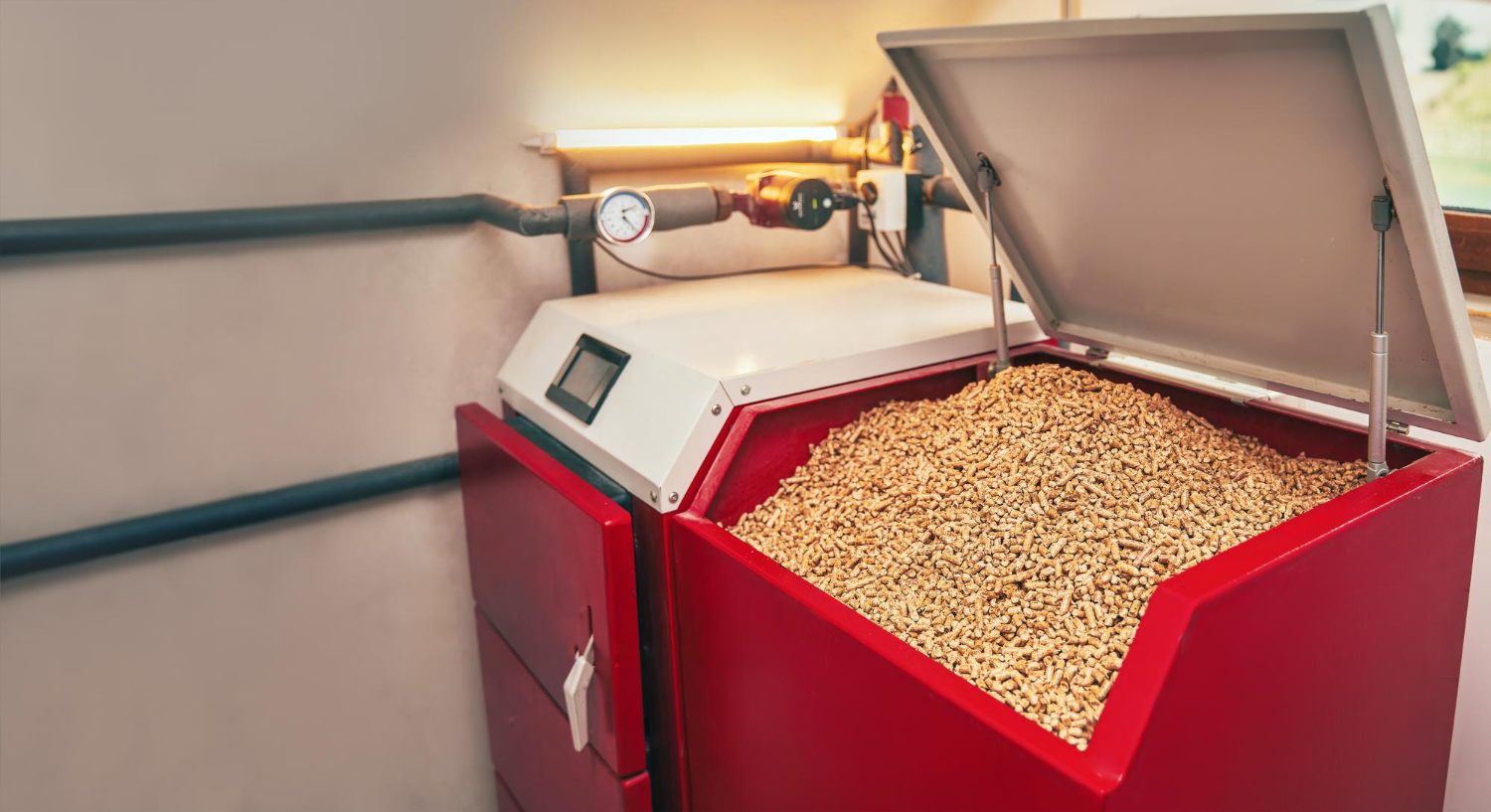In recent years, the importance of sustainable heating solutions has gained significant traction. Among these, biomass boilers have emerged as a promising alternative, harnessing renewable energy sources to provide efficient heating for homes and businesses. As you consider your options for heating, understanding what biomass boilers are and how they operate can help you make informed decisions.
Biomass boilers use organic materials as fuel, offering a way to utilise waste products while reducing carbon emissions. This method of heating not only supports environmental sustainability but can also lead to long-term cost savings. By the end of this guide, you will be equipped with the knowledge to determine if a biomass boiler is the right choice for your property.
In this article, we will delve into the functionality, fuel sources, costs, and various considerations associated with biomass boilers. You’ll learn about the inner workings of these systems, their environmental impact, and available financial incentives in the UK. Let’s embark on this journey to explore the world of biomass heating.
What Is a Biomass Boiler? Understanding the Basics
A biomass boiler is a heating system that generates heat by burning organic materials. These materials can include wood pellets, chips, logs, and agricultural waste. The combustion process releases heat energy, which is then used to heat water or air for residential or commercial purposes. Unlike traditional fossil fuel systems, biomass boilers utilise renewable resources, making them a more environmentally friendly option.
The primary components of a biomass boiler include the combustion chamber, heat exchanger, and control system. The combustion chamber is where the biomass fuel is burned, while the heat exchanger transfers the generated heat to water or air. The control system regulates the operation of the boiler, ensuring optimal performance and efficiency.
When considering a biomass boiler, it’s crucial to understand its operation and how it fits into your heating needs. By choosing biomass, you are not only opting for a sustainable option but also contributing to the reduction of your carbon footprint.
The Inner Workings of a Biomass Boiler: A Step-by-Step Explanation
Understanding the mechanics of a biomass boiler can be complex, but breaking it down into steps helps simplify the process. Here’s how a biomass boiler typically operates:
- Fuel Loading: Biomass fuel is loaded into the boiler, either manually or automatically. Automatic systems often use hoppers to store and feed the fuel into the combustion chamber.
- Ignition: Once the fuel is in place, the ignition process begins, which may involve an electric ignition or manual lighting, depending on the system design.
- Combustion: The fuel burns in the combustion chamber, producing hot gases. The combustion process must be optimal to ensure complete burning, which not only maximises heat output but also minimises emissions.
- Heat Transfer: The hot gases pass through a heat exchanger, transferring their heat to water or air. This heated water or air is then circulated throughout your property.
- Flue Gas Management: After heat transfer, the remaining flue gases are expelled through a flue system. Modern biomass boilers often include filters to reduce particulate emissions, ensuring compliance with environmental regulations.
By understanding these steps, you can appreciate the efficiency and effectiveness of biomass boilers. They not only provide a reliable heating source but also do so with a focus on sustainability.
Fuel Sources for Biomass Boilers: From Wood Pellets to Agricultural Waste
The versatility of biomass boilers lies in the variety of fuel sources available. The choice of fuel can significantly affect the performance, cost, and environmental impact of your heating system. Below are some common biomass fuel sources you might consider:
- Wood Pellets: These are small, cylindrical pellets made from compressed sawdust. Wood pellets are highly efficient and have a low moisture content, making them an excellent choice for biomass boilers. Their uniform size allows for consistent combustion and heat output.
- Wood Chips: Larger than pellets, wood chips are made from chipped logs and branches. They are more cost-effective compared to pellets but may require a larger storage space. The moisture content can vary, affecting efficiency.
- Logs: Traditional logs can be used in biomass boilers, especially in systems designed for larger solid fuels. While logs are widely available, they require more handling and may not burn as efficiently as pellets or chips.
- Agricultural Waste: Biomass boilers can also utilise agricultural residues, such as straw or corn stover. This not only provides a waste management solution for farmers but also contributes to a circular economy.
Each fuel type has its advantages and considerations. When selecting a fuel source, you should evaluate factors such as availability, cost, and compatibility with your biomass boiler.
Types of Biomass Fuels: Exploring Your Options
As you explore your options for biomass fuels, it is essential to understand the different types available. Each type offers unique benefits and challenges, which can influence your choice of boiler system. Here’s a closer look at the main categories of biomass fuels:
- Wood-Based Fuels: This category includes wood pellets, chips, and logs. Wood-based fuels are among the most common biomass sources and are often preferred for their high energy content and ease of use.
- Agricultural Residues: This includes materials like straw, corn husks, and other crop leftovers. Using agricultural waste in biomass boilers not only provides a renewable fuel source but also helps manage waste effectively.
- Energy Crops: Some farmers cultivate specific crops, such as miscanthus or switchgrass, primarily for energy production. These crops can be harvested annually and provide a sustainable fuel source for biomass heating.
- By-Products and Waste: Industrial by-products, such as sawdust and wood shavings, can also be used as biomass fuel. This offers a cost-effective way to utilise waste materials while reducing disposal costs.
When considering your biomass fuel options, think about local availability, your heating requirements, and any sustainability goals you may have. The right choice can enhance the efficiency and environmental benefits of your biomass heating system.
The Environmental Impact of Biomass Boilers: A Green Alternative?
Biomass boilers present a compelling case for those seeking environmentally friendly heating alternatives. While all heating systems impact the environment, biomass boilers tend to have a lower carbon footprint compared to traditional fossil fuel systems. Here are some key environmental benefits associated with biomass heating:
- Carbon Neutrality: When biomass is burned, the carbon dioxide released is roughly equivalent to the amount absorbed during the plant’s growth. This balance contributes to a more carbon-neutral heating solution, especially when using sustainably sourced biomass.
- Waste Reduction: By utilising waste products such as agricultural residues and wood by-products, biomass boilers help reduce landfill waste. This contributes to a circular economy where waste is repurposed into energy.
- Local Energy Production: Biomass fuels can often be sourced locally, reducing transportation emissions and supporting local economies. This local sourcing can also enhance energy security, as it lessens dependence on imported fossil fuels.
However, it’s essential to consider the entire lifecycle of biomass production and usage. Sustainable practices, such as responsible sourcing and efficient combustion technologies, are vital to maximising environmental benefits.
Cost Considerations: Initial Investment and Long-Term Savings
When contemplating a biomass boiler, understanding the financial implications is crucial. The initial investment for a biomass boiler can be higher than that of traditional heating systems, but the long-term savings and environmental benefits often make it a worthwhile consideration. Here’s a breakdown of the costs you should consider:
- Initial Installation Costs: The purchase and installation of a biomass boiler can vary significantly based on the system size and complexity. On average, the cost can range from £5,000 to £15,000, depending on the type of boiler and installation requirements.
- Fuel Costs: The ongoing fuel costs for biomass boilers can fluctuate based on market conditions and the type of fuel used. However, biomass fuels are generally more affordable than fossil fuels, which can lead to substantial savings over time.
- Maintenance Costs: Regular maintenance is essential for optimal performance. While biomass boilers may require more frequent cleaning than conventional systems, many users find that the overall maintenance costs are manageable.
- Incentives and Grants: In the UK, various financial incentives exist for those installing biomass heating systems, such as the Renewable Heat Incentive (RHI). These incentives can significantly offset your initial investment, making biomass more accessible.
By carefully evaluating these cost considerations, you can determine if a biomass boiler aligns with your financial goals while providing the sustainable heating solution you desire.
Financial Support and Incentives for Biomass Boiler Installation in the UK
The UK government recognises the importance of renewable energy solutions, including biomass boilers, and offers various financial support options to promote their adoption. Understanding these incentives can greatly reduce your overall costs. Here are some key programmes available:
- Renewable Heat Incentive (RHI): This government scheme provides financial incentives for homeowners, businesses, and communities that install renewable heating technologies, including biomass boilers. Participants can receive payments over seven years based on the heat generated by their biomass systems.
- Green Homes Grant: Although this scheme has been phased out, it previously offered vouchers to homeowners for energy-efficient home improvements, including biomass boiler installations. Keep an eye out for similar future initiatives that may arise.
- Local Authority Grants: Many local councils offer grants or funding options for renewable energy projects, including biomass heating. Check with your local authority to discover what support might be available in your area.
- Tax Benefits: Some local or national incentives may also include reduced VAT rates or exemptions for renewable energy systems. These financial benefits can further lower the cost of installing a biomass boiler.
By taking advantage of these financial support options, you can significantly reduce the initial investment required for a biomass boiler, making it a more viable and attractive heating solution.
Maintenance and Upkeep: Keeping Your Biomass Boiler in Top Shape
To ensure the longevity and efficiency of your biomass boiler, regular maintenance is essential. While these systems are generally robust, neglecting upkeep can lead to performance issues and higher operational costs. Here’s how you can keep your biomass boiler in optimal condition:
- Regular Cleaning: Biomass boilers require routine cleaning to remove ash and soot buildup. This not only improves efficiency but also reduces the risk of operational issues. It’s advisable to schedule professional cleanings at least once a year, or more frequently if you use the system heavily.
- Inspection of Components: Regular inspections of critical components, including the combustion chamber, flue pipes, and heat exchangers, are vital. Identifying wear and tear early can prevent costly repairs and extend the life of your system.
- Monitoring Performance: Keep an eye on the performance of your biomass boiler, including fuel consumption and heat output. Any significant changes may indicate underlying issues that require immediate attention.
- Professional Servicing: Engaging a qualified technician for annual servicing is highly recommended. They can conduct thorough checks, provide recommendations for improvements, and ensure that your system complies with safety and environmental standards.
By committing to regular maintenance and monitoring, you can enjoy the benefits of your biomass boiler for years to come, ensuring it operates efficiently and reliably.
Comparing Biomass Boilers to Traditional Heating Systems
When deciding on a heating system, it’s essential to weigh the benefits of biomass boilers against traditional options like gas, oil, or electric heating. Each system comes with its own set of advantages and challenges. Here’s a comparison to help you make an informed choice:
| Feature | Biomass Boilers | Traditional Heating Systems |
| Fuel Source | Renewable (wood pellets, etc.) | Fossil fuels (gas, oil) |
| Carbon Footprint | Lower, carbon-neutral potential | Higher, contributes to emissions |
| Installation Cost | Higher initial investment | Generally lower upfront costs |
| Operating Costs | Potentially lower long-term savings | Variable based on fuel prices |
| Maintenance | Requires regular upkeep | Generally lower maintenance needs |
| Efficiency | High when optimised | Varies by system and fuel type |
While biomass boilers may require a more substantial initial investment, they offer long-term savings and environmental benefits that traditional systems may not provide. Additionally, the shift towards renewable energy sources is gaining momentum, making biomass an increasingly attractive option.
Ultimately, your decision should be based on a combination of factors, including your property’s heating requirements, available fuel sources, and your commitment to sustainability.
Is a Biomass Boiler Right for Your Property? Key Factors to Consider
Before making the leap into biomass heating, it’s essential to assess whether a biomass boiler is the right fit for your property. Consider the following factors:
- Space Requirements: Biomass boilers, especially those that use bulk fuels like wood pellets or chips, require adequate space for both the boiler and fuel storage. Assess whether you have sufficient space for installation and storage.
- Heating Demand: Evaluate your heating needs based on the size of your property and your typical energy consumption. Biomass boilers are particularly effective for larger properties or those with high heating demands.
- Fuel Availability: Consider the availability of biomass fuel in your area. If you have easy access to sustainable wood sources or agricultural waste, biomass heating may be a viable option.
- Environmental Goals: If reducing your carbon footprint and supporting sustainable energy practices are important to you, a biomass boiler aligns well with those goals.
- Financial Considerations: Review your budget for both initial investment and ongoing costs. Factor in potential financial incentives that could offset your investment.
By carefully evaluating these factors, you can determine whether a biomass boiler suits your specific needs and contributes to your long-term goals.
The Future of Biomass Heating: Innovations and Trends
As the world continues to focus on renewable energy solutions, biomass heating is poised for further innovation. Here are some trends you can expect to see in the future:
- Advanced Technologies: Innovations in biomass combustion technology are enhancing efficiency and emissions control. New systems are being developed to optimise combustion processes, leading to cleaner and more efficient heating.
- Integration with Smart Systems: The rise of smart home technology is making its way into biomass heating. Systems that can be controlled remotely or programmed for optimal performance are likely to become more common.
- Sustainable Practices: The emphasis on sustainability will continue to drive improvements in biomass sourcing and production. Expect to see more focus on responsibly sourced materials and waste-to-energy initiatives.
- Hybrid Systems: The future may also see an increase in hybrid heating systems that combine biomass with other renewable sources, such as solar panels. This approach can enhance efficiency and energy independence.
By staying informed about these advancements, you can ensure that your biomass heating system remains efficient and aligned with the latest sustainable practices.
Conclusion: Embracing Sustainable Heating with Biomass Boilers
In summary, biomass boilers present a sustainable and efficient heating solution that aligns with contemporary environmental goals. By understanding their functionality, fuel sources, costs, and maintenance needs, you can make informed decisions about your heating options.
The journey towards sustainable heating is not only beneficial for the environment but can also lead to significant long-term savings. With various financial incentives available in the UK, now is a great time to consider the potential of biomass boilers for your property.
If you are ready to take the next step in embracing sustainable heating, consider consulting with a qualified professional from Proadvance Ltd to assess your options and determine the best solution for your needs.
Take the first step towards a greener future with a biomass boiler today!






